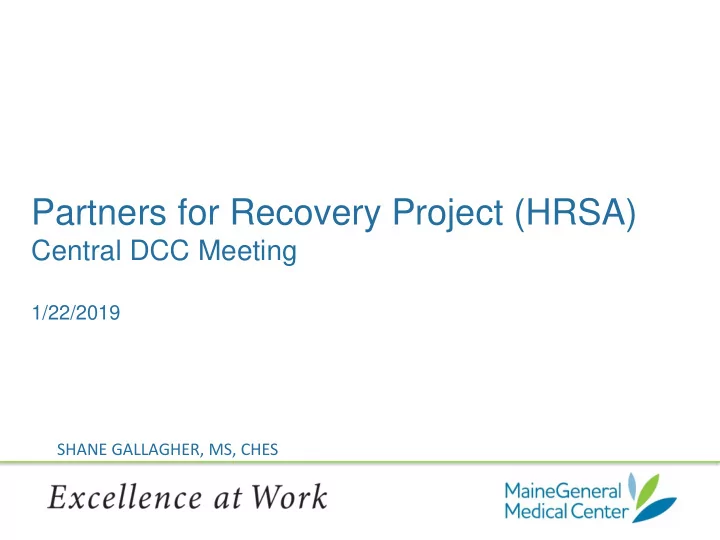

Partners for Recovery Project (HRSA) Central DCC Meeting 1/22/2019 SHANE GALLAGHER, MS, CHES
Overview ➢ PFR Grant Overview ➢ Vision/Mission ➢ Org Chart ➢ Focus Areas ➢ DCC’s role?
Partners for Recovery Project ➢ HRSA funded ➢ 3 year/$750,000 ➢ Goal – Decrease opioid OD deaths in Central PH District ➢ Consortium /Advisory Group
Vision/Mission Vision : To build healthy, thriving communities where everyone has what they need to prevent drug overdose deaths and where OUD is viewed and treated as a chronic disease. Mission : To reduce overdose deaths from substance use disorders by increasing access to naloxone, strengthening and expanding partnerships, increasing treatment capacity, and implementing systems related to screening and referral to substance use disorder services in the Central Public Health District.
Focus Areas ➢ Stigma ➢ Increase access to MAT ➢ Screening and referrals ➢ Naloxone ➢ Raising community awareness
Stigma Assessments ➢ Self-Stigma (individual) ➢ Social Stigma (community) ➢ Structural Stigma (healthcare) Workgroup ➢ Develop stigma-informed communications ➢ Trainings ➢ Based on assessment findings
Increase access to MAT Themes across Central District: ➢ shortage of health care, mental health, counseling providers ➢ Access to OUD services challenging ➢ Primary care staff not trained to provide counseling Capacity building workgroup ➢ Recruit and train providers ➢ Engage stakeholders of individual and regional training needs ➢ address structural stigma assessment findings
Screening and Referrals ➢ Conduct assessment of regional OUD services ➢ Create regional directory ➢ Maintain up to date OUD service directory ➢ Build upon resource and referral system – utilize the Hub Capacity Building Workgroup ➢ Develop interagency care coordination ➢ Increase screening and referrals from community partners
Naloxone ➢ Research recommendations, guidelines and best practices ➢ Update existing screening and prescribing guidelines developed during ROOR Workgroup: ➢ Develop district wide training and distribution plan ➢ Increase number of naloxone prescriptions written ➢ Increase kits distributed from inpatient and outpatient (primary care) settings
Raising Community Awareness ➢ Improve knowledge of OUD ➢ Maintain up to date OUD service directory ➢ Build upon resource and referral system – utilize the Hub Capacity Building Workgroup ➢ Develop interagency care coordination ➢ Increase screening and referrals from community partners to OUD services
DCC’s Role ➢ Participate in the Advisory Team Process ➢ Participate on topic specific work groups ➢ Help identify partners for work groups
Next Steps • Stigma Assessment (March 2019) • Develop workgroups – Stigma/communications (May 2019 – MAT Capacity Building (February 2019) – Screening & Referral (February 2019) – Naloxone (February 2019) • Develop and submit Assessment Plan (March 2019)
Questions? Contact: Shane Gallagher shane.gallagher@mainegeneral.org Phone: 861-5253 Brianne Karstens Brianne.Karstens@MaineGeneral.org Phone: 861-5278
Recommend
More recommend